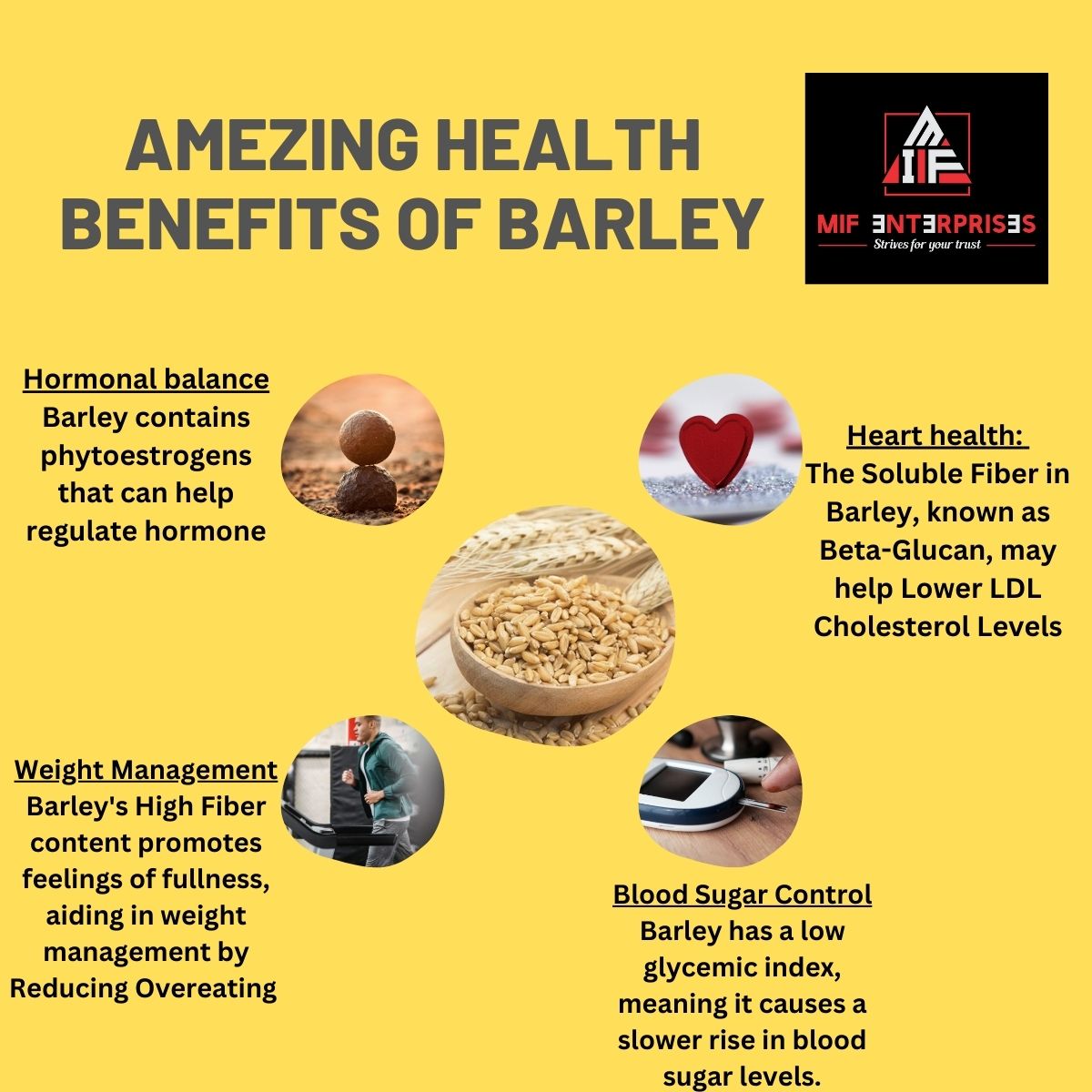In this article you will get the valuable information on Jau / Barley Benefits and its Side Effects, Barley Nutrition, how to use Barley, Is Barley Good for Weight Loss?, Barley Juice Benefits, Benefits of Barley Water, Barley Side Effects, Barley Capsule Benefits, How To Use Barley for Diabetes, Barley Powder Benefits, Is Barley good for Diabetics? is Pearl Barley Good for you? and many more.

Supercharge Your Health in 2023 Embrace the Remarkable Jau / Barley Benefits
In the vast realm of superfoods, one grain reigns supreme, captivating both taste buds and health enthusiasts alike. Enter barley, a seemingly humble cereal grain that conceals a treasure trove of health benefits within its unassuming husk. In this article, we embark on a journey to unravel the enigmatic marvel that is barley, delving into its complex nutritional composition and the myriad ways it can positively impact our well-being.
Barley / Jau other Names;
| Sl No. | Name | Region |
| 1 | Pearl barley | Global |
| 2 | Hulled barley | Global |
| 3 | Pot barley | Global |
| 4 | Naked barley |
Global |
| 5 | Black barley | Global |
| 6 | Purple barley | Global |
| 7 | Barleycorn | Global |
| 8 | Barley groats | Global |
| 9 | Coarse barley | Global |
| 10 | Barley grits | Global |
| 11 | Flaked barley | Global |
| 12 | Barley malt | Global |
| 13 | Barley grass | Global |
| 14 | Job’s tears. | East Asia |
| 15 | Hordeum vulgare | Latin |
| 16 | Scotch barley | Scotland |
| 17 | Bere barley | Scotland |
| 18 | Emmer barley | Europe |
| 19 | Spelt barley | Europe |
| 20 | Jau | Asia |
The Nutritional Values Of Jau / Barley Per 100 Grams Are As Follows;
- Calories: 354 kcal
- Carbohydrates: 73.5 grams
- Protein: 12.5 grams
- Fat: 2.3 grams
- Fiber: 17.3 grams
- Sugars: 0.8 grams
- Calcium: 33 milligrams
- Iron: 2.5 milligrams
- Magnesium: 79 milligrams
- Phosphorus: 264 milligrams
- Potassium: 452 milligrams
- Sodium: 12 milligrams
- Zinc: 2.2 milligrams
- Vitamin C: 0 milligrams
- Vitamin B1 (Thiamine): 0.19 milligrams
- Vitamin B2 (Riboflavin): 0.12 milligrams
- Vitamin B3 (Niacin): 3.6 milligrams
- Vitamin B6: 0.3 milligrams
Please Note: That these values are approximate and can vary depending on the specific variety and preparation method of Barley.
Supercharge Your Health in 2023 Embrace the Remarkable Jau / Barley Benefits

Jau / Barley Benefits for Women
- Hormonal balance: Barley contains phytoestrogens that can help regulate hormone levels in women, potentially alleviating symptoms associated with hormonal imbalances.
- Heart health: The soluble fiber in barley, known as beta-glucan, may help lower LDL cholesterol levels, reducing the risk of heart disease in women.
- Weight management: Barley’s high fiber content promotes feelings of fullness, aiding in weight management by reducing overeating and controlling appetite.
- Digestive health: The fiber in barley supports healthy digestion and helps prevent constipation, a common concern among women.
- Blood sugar control: Barley has a low glycemic index, meaning it causes a slower rise in blood sugar levels. This can be beneficial for women with diabetes or those looking to manage their blood sugar levels.
- Bone health: Barley contains minerals like magnesium, phosphorus, and calcium, which are essential for maintaining strong bones and preventing conditions such as osteoporosis.
- Nutrient-rich: Barley is a good source of vitamins and minerals, including B vitamins, iron, and zinc, which are important for overall health and well-being in women.
Jau / Barley Benefits for Men
- Heart health: Barley’s soluble fiber, particularly beta-glucan, can help lower LDL cholesterol levels, reducing the risk of heart disease and promoting cardiovascular health in men.
- Weight management: The high fiber content in barley promotes feelings of fullness, aiding in weight management and healthy weight loss efforts for men.
- Digestive health: Barley’s fiber helps maintain regular bowel movements and supports a healthy digestive system, reducing the risk of constipation and improving gut health.
- Blood sugar control: Barley has a low glycemic index, which means it can help regulate blood sugar levels, making it beneficial for men with diabetes or those aiming to manage their blood sugar.
- Muscle recovery: Barley is a good source of complex carbohydrates, which can provide sustained energy and aid in muscle recovery after exercise or physical activity.
- Nutrient-rich: Barley is packed with essential vitamins and minerals, such as B vitamins, magnesium, and zinc, which are important for overall health, energy production, and optimal functioning of various bodily systems in men.
- Prostate health: Some studies suggest that the phytochemicals present in barley may have protective effects on prostate health, potentially reducing the risk of prostate-related issues in men.
Jau / Barley Benefits for Children
- Digestive health: Barley is rich in dietary fiber, which promotes healthy digestion and helps prevent constipation in children.
- Nutrient-rich: Barley contains essential vitamins and minerals, including B vitamins, iron, and magnesium, which are crucial for children’s growth, development, and overall health.
- Energy source: Barley provides complex carbohydrates that serve as a sustained energy source for active children, supporting their physical activities and daily functions.
- Immune support: Barley contains antioxidants and immune-boosting nutrients that can help strengthen children’s immune systems and protect against illnesses.
- Bone development: The minerals present in barley, such as calcium, phosphorus, and magnesium, contribute to the development of strong and healthy bones in growing children.
- Brain health: Barley’s nutrients, including B vitamins, support brain function and cognitive development in children, aiding in memory, concentration, and learning abilities.
- Weight management: The high fiber content in barley promotes feelings of fullness, which can help children maintain a healthy weight and prevent overeating.
General Guidelines Regarding Jau / Barley Dosage
- Serving size: A typical serving size of cooked barley is around ½ cup to 1 cup, depending on your nutritional needs and the specific recipe or meal.
- Gradual introduction: If you are new to consuming barley, it is advisable to start with small amounts and gradually increase the portion sizes over time. This allows your body to adjust to the fiber content and minimizes the risk of digestive discomfort.
- Daily intake: There is no specific recommended daily intake for barley, but including it as part of a balanced diet can be beneficial. Aim to incorporate it into your meals 2-3 times per week or as desired.
- Consider dietary restrictions: If you have specific dietary restrictions or conditions, such as celiac disease or gluten sensitivity, ensure that the barley you consume is gluten-free or seek alternatives like Hulled Barley.
- Consult with a healthcare professional: If you have any underlying health conditions or concerns, it is always best to consult with a healthcare professional or a registered dietitian for personalized guidance on incorporating barley into your diet.
Jau / Barley Precautions to Consider
- Allergies: Some individuals may be allergic to barley or gluten, a protein found in barley. If you have known allergies to grains or gluten, it is important to avoid barley and opt for gluten-free alternatives.
- Celiac disease: People with celiac disease should avoid barley, as it contains gluten, which can trigger symptoms and damage the small intestine. Gluten-free barley alternatives, such as hulled barley or gluten-free grains, can be suitable options.
- Digestive sensitivity: Barley is high in fiber, which may cause digestive discomfort in some individuals, especially if consumed in large quantities or if the body is not accustomed to high-fiber foods. It is advisable to start with small portions and gradually increase the amount of barley in your diet to allow your digestive system to adjust.
- Medication interactions: If you are taking medications, especially blood thinners or medications for diabetes, it is recommended to consult with your healthcare provider before significantly increasing your barley intake. Barley’s high fiber content and potential interactions with medications should be considered.
- Moderation: While barley offers various health benefits, it is important to consume it in moderation as part of a balanced diet. Excessive consumption of barley or any single food item may lead to an imbalance in nutrient intake.
How to Consume Jau / Barley to Enjoy Their Benefits
- Cooked Jau / Barley: The most common way to consume barley is by cooking it. Rinse the barley grains thoroughly and then combine them with water or broth in a pot. Use a 1:3 ratio of barley to liquid. Bring it to a boil, then reduce the heat and simmer for about 30-40 minutes or until the barley is tender. Cooked barley can be enjoyed as a side dish, added to soups, stews, salads, or used as a base for grain bowls.
- Jau / Barley Flour: Barley flour is a versatile option that can be used in baking. It can be mixed with other flours to make bread, muffins, pancakes, or cookies. Keep in mind that barley flour contains gluten, so it is not suitable for individuals with celiac disease or gluten intolerance.
- Jau / Barley Flakes: Barley flakes, similar to rolled oats, can be used to make hot cereal or added to baked goods like cookies and granola bars. Simply cook the flakes with water or milk, add sweeteners or toppings of your choice, and enjoy a warm and nutritious breakfast.
- Jau / Barley Water: Barley water is a refreshing and hydrating beverage. To prepare it, simmer barley grains in water for about 30 minutes. Strain the liquid and let it cool. You can add flavors like lemon, honey, or herbs to enhance the taste. Barley water can be enjoyed chilled or at room temperature.
- Jau / Barley Salad: Cooked barley can be used as the base for a hearty and nutritious salad. Combine it with fresh vegetables, herbs, proteins like grilled chicken or tofu, and dress it with a vinaigrette or dressing of your choice.
- Jau / Barley Soup: Barley can be a delicious addition to soups. Its nutty flavor and chewy texture add depth to various soup recipes. Combine cooked barley with vegetables, broth, and your choice of seasonings to create a hearty and comforting barley soup.
- Jau / Barley Risotto: Use barley as a substitute for rice in a classic risotto recipe. Cook the barley in vegetable or chicken broth and slowly add the broth while stirring until the barley reaches a creamy consistency. Incorporate ingredients like mushrooms, peas, or Parmesan cheese for added flavor.
- Jau / Barley Porridge: Similar to oatmeal, you can create a warm and nourishing barley porridge. Cook barley with milk or plant-based milk, adding sweeteners like honey or maple syrup, and toppings such as fresh fruits, nuts, or cinnamon for a delicious and nutritious breakfast option.
- Jau / Barley Stir-Fry: Barley can be used as a grain base in a vegetable stir-fry. Cook the barley beforehand and stir-fry it with an assortment of colorful vegetables, protein of your choice, and seasonings like soy sauce or ginger for a wholesome and flavorful meal.
- Jau / Barley Smoothies: Incorporate cooked and cooled barley into your smoothies for an added nutritional boost. Blend it with fruits, yogurt or milk, and your choice of sweeteners to create a refreshing and filling smoothie.
- Jau / Barley Pudding: Create a delightful dessert by using barley as the main ingredient in a creamy pudding. Cook barley with milk, sweeteners, and flavors like vanilla or cinnamon until it thickens. Serve it chilled and top it with fruits or a sprinkle of nuts for a satisfying treat.
Frequently Asked Questions and Their Answers
Q1: What Are The Health Benefits of Barley?
Answer: Barley offers numerous health benefits, including improved heart health, regulation of blood sugar levels, support for weight management, and enhanced digestive health due to its high fiber content.
Q2: How Can I Incorporate Barley Into My Diet?
Answer: Barley can be consumed in various forms, such as in soups, stews, salads, or even as a side dish. It can be cooked like rice or used as a substitute for other grains in recipes.
Q3: Is Barley Gluten-Free?
Answer: No, barley contains gluten. Individuals with gluten sensitivity or celiac disease should avoid consuming barley or opt for gluten-free alternatives.
Q4: Can Barley Help With Weight Loss?
Answer: Yes, barley can support weight loss efforts. Its high fiber content promotes satiety, helping you feel fuller for longer and potentially reducing overall calorie intake.
Q5: Does Barley Help Lower Cholesterol Levels?
Answer: Yes, the soluble fiber found in barley, specifically beta-glucan, has been shown to help reduce LDL (“bad”) cholesterol levels, thereby promoting heart health.
Q6: Is Barley Suitable For Individuals With Diabetes?
Answer: Barley has a low glycemic index and contains soluble fibers, which can help regulate blood sugar levels. However, it’s advisable to consult a healthcare professional for personalized guidance.
Q7: What Nutrients Are Found In Barley?
Answer: Barley is rich in vitamins (B vitamins, vitamin E) and minerals (magnesium, phosphorus, selenium). It also contains antioxidants and phytochemicals that contribute to its health benefits.
Q8: Can Barley Help With Digestive Issues?
Answer: Yes, the high fiber content in barley promotes healthy digestion and can aid in relieving constipation and maintaining regular bowel movements.
Q9: Is Barley Beneficial For Heart Health?
Answer: Yes, barley’s fiber, antioxidants, and heart-healthy nutrients contribute to cardiovascular well-being by reducing the risk of heart disease and supporting overall heart health.
Q10: Are There Any Potential Allergenic Reactions To Barley?
Answer: Some individuals may have allergic reactions to barley. If you experience any adverse symptoms after consuming barley, such as hives, itching, or difficulty breathing, seek medical attention immediately.

Jau / Barley is Available in other Sources
Barley Grass Juice Powder Organic
Disclaimer: The following home remedies are provided for informational purposes only and should not be considered a substitute for professional medical advice. These remedies are not intended to diagnose, treat, cure, or prevent any disease. It is important to consult with a qualified healthcare provider before attempting any home remedies, especially if you have underlying health conditions, are taking medications, or are pregnant or breastfeeding. Individual results may vary, and the use of these remedies is at your own risk. The information provided is based on general knowledge and traditional uses, and its accuracy or effectiveness cannot be guaranteed.
Must Read Our Key Informational Articles
Health Benefits of Black Seed / Kalonji
Health Benefits of Pomegranate
4 thoughts on “Supercharge Your Health in 2023 Embrace the Remarkable Jau / Barley Benefits”